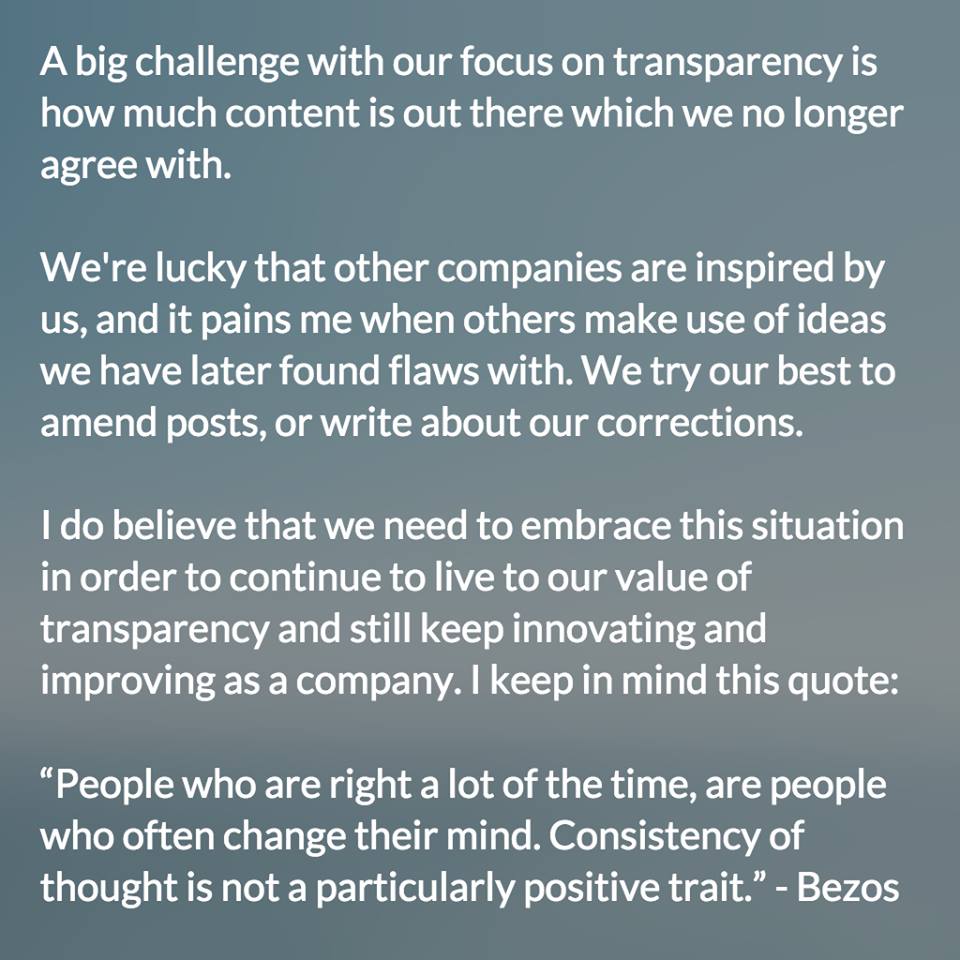When Transparency Meets Inconsistency: My Philosophy on Sharing Openly Even As We Change Course

Founder CEO @ Buffer
I’ve been fortunate to have many great mentors over the years, and as a result I try to spend a lot of time helping other founders.
When Buffer was going all the way with our self-management experiment, I was meeting weekly with someone who championed this concept within her company and successfully got the team started in this direction.
After several chats, Buffer hit a key phase of growth and I wasn’t able to connect with her for some months. During that same time, we were undergoing a big change in direction back toward more structure and reintroducing some hierarchy at Buffer.
About a month ago, I reached out to her and said, “We should talk again about self-management.”
So much had changed on our end around how we think about these things, and it didn’t feel great that I hadn’t updated her sooner.
One challenge of defaulting to transparency
This is a unique and potentially challenging outcome of our value of transparency that’s been on my mind for a while: What happens when we’re wrong?
We’ve been fairly upfront about this possibility from the start at Buffer, openly sharing the times that we’ve messed up or simply changed our minds.
But as we grow, we have more reach, and there’s potential for these ideas to spread further and trigger more people to be inspired by them and implement them.
As I reflected on the responsibility we have here, I shared this image on Facebook a couple of weeks ago:

I wanted to expand my thinking and share more with you here, with the knowledge that it will likely change again.
We plan to stay experimental…
I distinctly remember the moment we realized that it was time to move away from some of the ideas of self-management.
It was shortly after our Sydney retreat, and Leo and I had both noticed that the team hadn’t grown at all in the time since the previous retreat.
Once we shared our concerns, there was a bit of an “Oh crap” moment, where we realized we needed to turn things around.
Some of the ways that Buffer is different today is based on us trying to make those changes.
At the same time, I hope we’re building the company in such a way that we have capacity to do these crazy experiments going forward.
We might change our thoughts several times on a topic. I can think of topics where we might have had five different iterations—and with each one we’re super optimistic and confident that this is going to be the right version.
If it takes six months and ends up being a failure, I hope we’ll still do that. I think that’s the company we want to have.
Realizing our mistakes doesn’t make me want to be less experimental or transparent. If anything, it makes me want to think about how we can retain the experimental nature we have and still feel like we’re doing the right thing for people.
It’s key for us to not say, “Oh, we can’t fail now.” There are risks, but if you take a step back you might realize it’s still worth it.
In a way, we maybe want to see more failures, because we need those to get to the successes.
…but we might validate the experiments first.
We want to keep experimenting a lot, but at the same time we are also 75+ people now. That amount of people, all going in one direction, has a momentum. It gets harder to steer that in a completely different direction and steer it back again.
I think we have to be a bit thoughtful about how we experiment. In the early days we could be crazy; now we want to validate ideas a little more before opening them up to the whole team.
We might want to be careful with moving the whole company in a new direction without validation.
Looking back on how we crossed over to self-management, we were not very lean.
We’ve made this mistake in product, too—we spent months building a new version of the Chrome extension only to scrap it after realizing we’d been working without getting any feedback at all.
In a way what we did with self-management was like similar—from one day to the next we went completely to these new ideas.
And we’ll keep sharing it all
Personally, I feel a lot of responsibility and obligation to anyone we’re lucky enough to have following along with our journey and perhaps trying some of the ideas we try.
We have been privileged to be given a bit of a megaphone in the startup space, and it feels important to me to be thoughtful with how we make use of it.
Although part of it is just that we’re just sharing our own stories and holding ourselves accountable, we try to thoughtful about what we put out there, what we encourage, and how we phrase it.
In general, we try to say “We tried it, here’s how it went” not “You should do this.”
As we grow the team, we have the opportunity to be even more open and have more people focused on sharing what we’re doing in different areas.
I feel pretty positive about having more capacity to go back and amend what we have shared, add updates with our new thinking.
If we expand our transparency in that way, it will give us more confidence to keep trying new things.
Inconsistency can be a tool for success
But in the end, it’s still up to the individual to decide—after all, just because something didn’t work for us doesn’t mean it won’t be a great solution for another team.
This is one of the most useful things I learned during AngelPad, where there are many different types of mentors.
When we started, they told us that every mentor will have strong opinions and will tell you what you should do. But you have to remember, it’s up to you. It’s your company.
The way we do things at Buffer isn’t the right way or the only way—sometimes it’s not even the right way for us!
If you’re part of a startup, I believe that your success might actually be defined by whether you are willing to be inconsistent.
I’ve learned that sometimes the best thing you can do is get contradictory advice. Because then you have to make the decision yourself.
What do you think—can you be both transparent and inconsistent? How do they work together? I’m keen to hear your take.
Try Buffer for free
180,000+ creators, small businesses, and marketers use Buffer to grow their audiences every month.
Related Articles

We've been hosting Retreats at Buffer for 12+ years. In this article, we've detailed everything we've learned from 14 Retreats.

I recently attended my first in-person, international conference. Here's what I learned.

What it was like to join a fully remote team like Buffer, and how going on the company retreat so early on helped shape my journey in ways I hadn’t imagined.